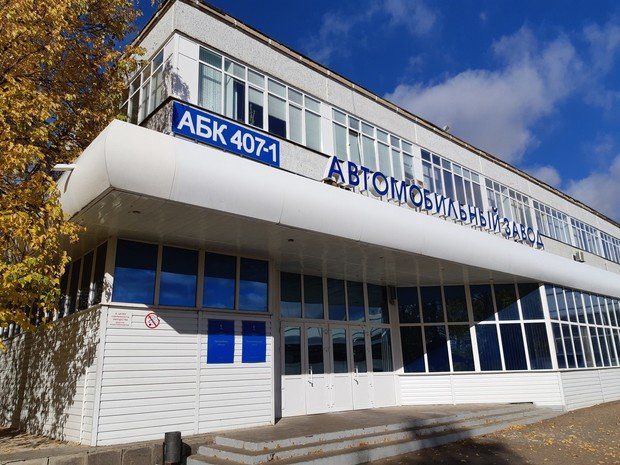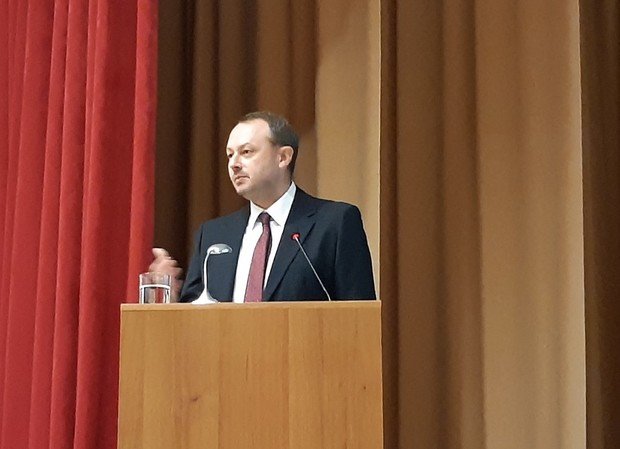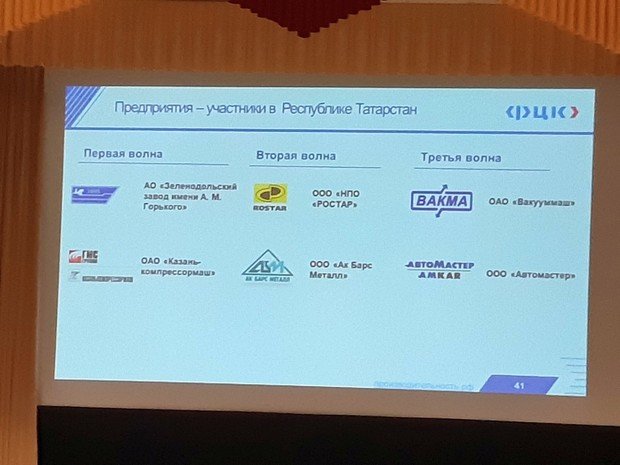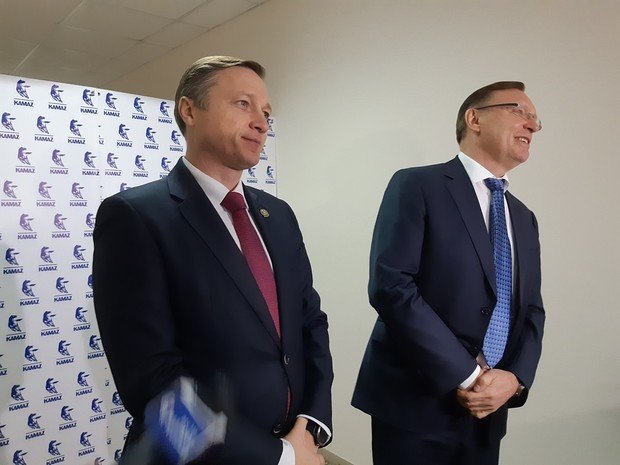''In no case we should get the negative impact of the national project in the form of staff reduction!''
The seminar on industry digitalization and the implementation of the national project Labour Productivity and Employment Support was held in KAMAZ with the participation of the ministry of industry and trade of Tatarstan on 12 October. The seemingly boring name hides a real headache for the current authorities: as you know, Russian President Vladimir Putin after his election issued the decree on national goals and strategic objectives of the development of the Russian Federation for the period until 2024, according to which productivity growth must reach 5%. The government will raise it through financial 'goodies' for the enterprises. Tatarstan with its six enterprises is also among the pilot regions. The correspondent of Realnoe Vremya, having attended the seminar, clarified from Deputy Prime Minister Abert Karimov what benefit the republic would get and learned from Director General of the Federal Centre of Competence (FCC) in the Field of Labour Productivity Nikolay Solomon how the authorities are going to solve the problem of staff reduction, inevitable in the case of a rise in labour productivity.
Will enterprises get any benefits from participation in the national project?
The amount of federal and regional budgets' expenditures for the implementation of the national project Labour Productivity and Employment Support is to be approved in a few days' time. According to preliminary data, it is expected to be 49,5 billion rubles. It is the amount they will have to spend on the implementation of the decree of Vladimir Putin he signed on 7 May 2018 to increase the labour productivity by 5% annually. Let us note that this decree applies only to basic non-primary sectors of the economy. About 30 billion rubles are proposed for targeted support of enterprises, about 7 billion — for systemic measures to improve productivity, and 14 billion rubles — to support employment. According to the national project, in 2021 the labour productivity growth is to reach 3,1%, but not in all regions, only in 57 (4,000 organizations will be involved), then only by 2024 all regions of the Russian Federation (10,000 enterprises) are to be included in the implementation of the national project. By 2022, labour productivity growth should give the Russian economy 1% of GDP, or 1 trillion rubles.
The emphasis will be made on measures ''to inform, involve and stimulate enterprises to increase productivity, to reduce administrative and regulatory barriers''. Thus, the companies that have concluded a preliminary agreement with the Federal Competence Centre, in which productivity will grow, will obtain priority access to state support measures, in particular, from the Industrial Development Fund. This as if should not require additional financial costs, as measures already exist. Conditionally, the enterprise with high productivity of work will be served in priority. Besides, the authorities will send experts to the enterprises, they will conduct trainings, teach lean production and methods of increasing productivity (something similar was done a few years ago by Czech Tomas Navratil in the ministries, departments and enterprises of the Republic of Tatarstan). Sixteen regions and 45 enterprises are already participating in the programme.

''Kiriyenko's man'' will supervise the development of labour productivity
Own head of the FCC, established in May this year, tried to explain at the elementary level all this legislative confusion to Tatarstan directors with the participation of Head of KAMAZ PJSC Sergey Kogogin and Minister of Industry and Trade Albert Karimov in Naberezhnye Chelny. His name is Nikolay Solomon, and this person is obviously close to First Deputy Head of the Presidential Administration Sergey Kiriyenko — the latter, as you know, at the time (in 2005-2016) headed Rosatom, and it is there, before sitting in the chair of the director of the FCC, Solomon worked (since 2009). He will be accountable not to the government of Dmitry Medvedev, but to the administration of the President of the Russian Federation and directly personally Putin, which means that they decided to take the growth of labour productivity seriously. By the way, in Rosatom Solomon oversaw the issues of increasing labour productivity in the nuclear industry as the first deputy director for corporate functions and chief financial officer of the group of companies.
It is interesting that in order to somehow weaken the skepticism of the directors, who are accustomed to listening to endless different business coaches and expensive trainings, Nikolay Solomon in his lecture demonstrated a clear irony to such consultants (as if saying 'do not confuse, I'm not like them!'). According to him, motivation is necessary for the growth of labour productivity in enterprises. Of course, he admitted, monetary motivation is more important (to pay money for a ''rational proposal''), but the culture of the enterprise is even more important.
What to do? According to Solomon, it is necessary to ''instil'' in the team clear rules for what the employees are encouraged and punished and the requirements of lean production (here the director sighed — the theme of lean production has been 'trendy' in Tatarstan for 10 years already). To do this, the director must learn how to change himself, because 80 percent of people would never want to change. He personally will have to drive the workforce outside the comfort zone, including through appearing in the workplace more often, showing, so to speak, by the example why all these boring words — goal-setting, project approach, process mapping, change management – are actually needed. Curiously, but speaking of the comfort zone and the staff, 80 percent of whom also does not want to change, Solomon remembered his former job, that is, Rosatom! In a self-critical manner he admitted that he was unnecessary on his previous post:
''Being engaged in the production system at Rosatom for the last five years, I realized that I am not a financier or economist whom this organization needs,'' he said with anguish. ''You can sit for a long time, analyze reports, print a lot of papers… But if you were not physically at production site, then you will never know where to really look for losses there!''

'Gentleman's agreement' has already been signed with six enterprises of Tatarstan
Unfortunately, ''long sitting, analysis of reports and printing of papers'' in the position of the financial director of Rosatom ''have had its impress on Solomon — frankly speaking, he is not very good business coach. It was difficult to extract any specifics from the traditional speeches about the motivation of the staff. Slides would be a good idea there. To the specifics (for which directors general, in fact, gathered there), he came only at the end of the speech: from the very beginning of the FCC project, he said, the directors general of the participating enterprises will be taken to exemplary enterprises, then the directors will be trained and sent to the production sites of federal and regional experts who will conduct trainings, training seminars, etc. According to the initiators of the project, in the future this experience will be transferred to the rest of the enterprises of the region. Solomon invited Tatarstan chiefs to visit the FCC website and make an application.
''We are waiting for you! We will train you for free for another 2 years. But then we will compensate 50 percent of the costs. From 2020, we will seek to share costs with companies, to have motivation,'' Solomon urged.
The agreement between the enterprise-participant of the programme and ANO FCC —ironically called 'Gentleman's agreement' — does not entail financial costs, will describe the target values of the programme and, most importantly (at first, for sure), will help to obtain preferential financing. Six enterprises from Tatarstan are already involved in the implementation of the national project: Zelenodolsk Plant named after A.M. Gorky, Ak Bars Metall PLC, Kazankompressormash JSC, NPO Rostar PLC, Vakuummash JSC and Automaster PLC.
However, the programme will not accept everyone. It is clear that Tatneft is not expected there (the national project affects ''non-primary industries''), but very small and very large companies also drop out. One of the main criteria for participation is the company's revenue in the amount of from 0,8 to 30 billion rubles per year, and the potential to increase labour productivity by not less than 10 percent a year. In addition, the company should be part of the priority sectors, such as manufacturing, agriculture, transport, trade, construction.
At the same time, the share of tax residents of foreign states in the authorized capital of a legal entity should not exceed 25 percent. That is, a number of companies whose owners hide in the Bahamas, Panama or Bermuda offshore, also drop out of the national project.

''In no case we should get the negative impact of the national project in the form of staff reduction!''
However, as Director General of the Zelenodolsk Shipbuilding Plant named after M.A. Gorky Alexander Karpov told at the seminar, his company joined the programme with the 2017 revenue exceeding the FCC criterion – 32,1 billion rubles. According to the plant's plan, in 2018 the labour productivity is to grow from 4,6 million rubles a person to 5,4 million, the output — from 25 to 28 billion rubles, in 2019 — to 5,8 million and 31 billion respectively, in 2020 — to almost 7 million and 35 billion.
It is significant that with the growth of labour productivity the company expects reductions: according to the plan, the number of employees of the plant by 2020 should be reduced by 300 — to 5,1 thousand people. For example, in the first half of 2017, labour productivity in KAMAZ increased by 37,4% to 1,6 million rubles per person, while the average number of employees decreased by 2,5%.
The Russian authorities, of course, understand this and, according to the national project, plan a ''comprehensive solution to reforming the employment system in the region, including reducing the imbalance of demand and supply of labour, creating new jobs, enhancing cooperation between employers, employment services, educational institutions and other participants in the labour market''. However, it is unclear what is behind the ''comprehensive solution''. On the understanding of the authorities it presses the problem, which Realnoe Vremya has repeatedly written: as a result of the demographic failure, a lot of able-bodied people (including, by the way, qualified personnel) are about to leave the labour market of the Russian Federation.
About the need to support employment in the framework of the project to improve productivity the correspondent of Realnoe Vremya was told after the seminar at the press conference by Nikolay Solomon, explaining that the national project itself, in fact, consists of three federal projects.
''First, it is supporting measures: everything related to the work of federal and regional authorities in terms of changing laws, preferential financing, perhaps some tax benefits. The main thing here is to remove administrative barriers. Where they limit rapid productivity growth. The second federal project is the targeted support — the reason why we have gathered here today. When the experts of federal or regional competencies work side by side with the employees of the enterprise, sharing the experience and skills with which positive experience will be spread in the region. The third federal project is the employment support. Because, one way or another, in some enterprises, the increase in labour productivity may be associated with a certain reduction of personnel. Therefore, it is very important to predict this in a timely manner, to retrain people. In no case we should get the negative impact of this national project in the form of staff reduction! It is necessary to employ people!''

Albert Karimov: ''The Tatarstan programme was an example for the federal national project''
When asked by the correspondent of Realnoe Vremya what amount out of 50 billion rubles Tatarstan can get (i.e. Tatarstan companies), Albert Karimov said that the federal share would require additional clarification, and reminded — apparently, not only us, but also the federal authorities — that Tatarstan is an example for the national project, as the republic's regional programme to support labour productivity has been implemented since 2011.
From 2005 to 2017, the labour productivity in Tatarstan increased by 3,7 times, from 272,000 rubles a year per employee to 996,000 rubles — with an increase in the number of employees by 9,5%. The Russian authorities plan to achieve a 5% increase in labour productivity by 2024 (i.e. in 6 years). But only if large corporations are involved in the implementation of the national project, Solomon said. How should they join when the limit of revenues in the national project is 30 billion rubles, of course, is not entirely clear. Meanwhile, KAMAZ PJSC — with a revenue of 156 billion rubles in 2017 (this giant, of course, will not be able to join the national project) — sets more ambitious goals for itself: Sergey Kogogin said after the seminar that the company is going to reach a productivity growth of 10-15%, while it is to double at new (digital) productions.